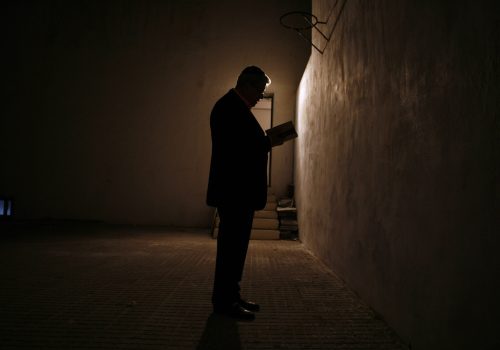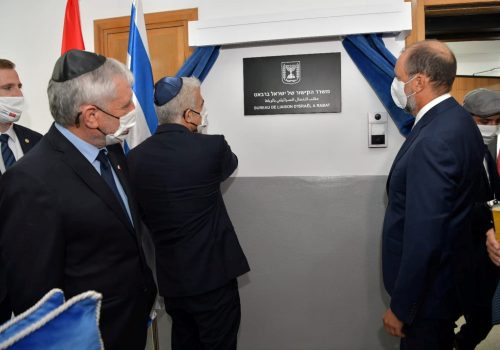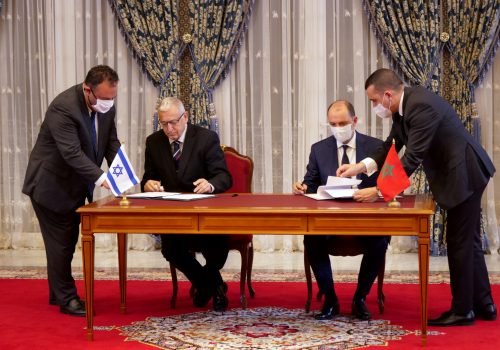Safeguarding the past: The Arab world’s cure to Holocaust amnesia

Seventy-eight years after World War II, as facts fade and fewer survivors remain, the Holocaust risks being forgotten. This natural amnesia is compounded by widespread campaigns to revise or repress Holocaust history. International Holocaust Remembrance Day on January 27 and Holocaust Remembrance Day (Yom Hashoah) on April 17 are important annual observances to counter these trends, but much more needs to be done year-round. Surprisingly, the Arab world may soon become a world leader in rejecting denialism to reassert “Never again!”
Present events constantly reshape the perceptions of the past and, indirectly, future outcomes. There are people in every country around the world who claim that the Holocaust never took place. In the Middle East and North Africa (MENA) region, Holocaust denial is mainly a trend among the younger generation due to a lack of Holocaust education in schools and after-school activities. For decades, the Holocaust has been a taboo subject, politicized and conflated with the Israeli-Palestinian conflict in official discourse. Historical truth is clouded, if not overshadowed, by key actors in the Arab world who connect Israeli state policies and the Jewish people worldwide—past and present, using them interchangeably, as if they were one. Opposition to Israel becomes resistance to the reality of Jewish suffering and injustice done to Jews in the past.
As a result, the Holocaust was absent from public consciousness until 2009, when Morocco’s King Mohammed VI became the first Arab leader to recognize the Holocaust by addressing the matter in a message addressed to the launch event of the Aladdin Project at UNESCO in Paris.
“Amnesia has no effect on my understanding of the Holocaust, or that of my people,” said the king, adding, “We must together endeavor to reassert reason and the values which underpin the legitimacy of a space of co-existence where the words of dignity, justice, and freedom will express themselves in the same way and will coexist, with the same requirements, regardless of our origins, cultures or spiritual ties. This is our interpretation, in Morocco, of the duty of remembrance dictated by the Shoah.”
Speaking at international conferences and forums devoted to the Holocaust and intercultural dialogue, King Mohammed VI and representatives of the Moroccan government have frequently emphasized the significance of denouncing anti-Semitism, instilling togetherness, and religious coexistence in Moroccan society, learning from the lessons of the Holocaust, and highlighting the crucial role that education plays in this context.
Challenges for Holocaust education in the Arab world
Past efforts at Holocaust education in the Arab world have too often suffered from a lack of context-specific sensitivity. In contrast to the king’s speech, which expresses the values and ideals of the Moroccan tradition as the basis for affirming Holocaust remembrance, others have simply translated Euro-centric Holocaust materials into Arabic, mainly from fear by civil society actors they would be blamed for “normalizing” with Israel if they tried to teach about the Holocaust. To effectively use Holocaust education as a tool for genocide prevention, the content should be tailored to Arab audiences using relevant wording, metaphors, names, and historical events.
In contrast to other areas of the world, World War II battles were fought, and Jews of the MENA region, directly or indirectly, experienced the Holocaust. Employing this little-known history in creating educational content is essential to sparking children’s imagination.
On the other hand, if this would only be a requirement, rather than a shared process of mutual development, educators would not take ownership of these materials and will lack the motivation to use these materials towards the essential goal of developing Holocaust education within the Arab world.
The power of participation
Today, initiatives all over the Middle East and North Africa try to promote Holocaust education through standard education approaches. However, teacher-to-student Holocaust education, while powerful, cannot reach the vast audience in need of this vital information and perspective. There is an increasing need to use state-of-the-art media, including those that allow for online sharing of ideas. While the hateful have exploited the Internet to spread racism, Holocaust denial, and other destructive ideologies, it can also serve as a powerful tool to educate and empower those fighting hate.
In 2011, the Kivunim Institute and Mimouna Association organized the first conference on the Holocaust in the Arab world commemorating the actions of the late King Mohammed V at Al Akhawayn University in Ifrane. An article in the New York Times praised the event as a “first of its kind in an Arab or Muslim nation, and a sign of historical truth triumphing over conspiracy theories and anti-Semitic dogma.”
The Mimouna Association and United States Holocaust Memorial Museum (USHMM) in 2017 jointly created the first Arabic-language Holocaust curriculum by and for Muslims. The Holocaust education material created was tailored to the specific context of the Arab and Muslim world.
The USHMM, which is celebrating its thirtieth anniversary this month, has prioritized promoting Holocaust education in the Arab world, for example, through Holocaust commemorations in Morocco in 2018 and 2022, and Egypt and the United Arab Emirates (UAE) in 2022 and 2023. In 2022, the USHMM organized an important Holocaust commemoration in the UAE and Egypt.
In the Emirates, Ahmed Obaid Al Mansoori created in 2021 the first Holocaust memorial exhibition in the Arab world at the Crossroads of Civilization Museum in Dubai. This permanent exhibit is the first of its kind in the Arab world, and offers visitors a setting within which to begin to understand the Holocaust and fight the denial of this dark chapter of human history.
In Morocco this year, the Mimouna Association, in partnership with the Council of Jewish Communities in Morocco, the United Nations Information Centre, and the ASF, provided over 120 students from different Moroccan universities and institutes, Moroccan Muslim activists, and members of the Moroccan Jewish community with an opportunity to engage and learn more about the history of the Holocaust.
In the largest synagogue of Casablanca, 350 guests—including university students, Morocco’s Minister of Education Chakib Benmoussa, diplomats from the United States, Israel, France, Germany, Poland, The Vatican, and Spain, as well as representatives from Moroccan civil society and international organizations—packed the pews to honor King Mohammed V, savior of the Moroccan Jewish community.
Recognizing the deep convictions, moral approach, and brave policy of Sultan Mohammed V, the US ambassador to Morocco, Puneet Talwar, affirmed, “His Majesty King Mohammed V protected Morocco’s Jews from the Nazis. And His Majesty King Mohammed VI has carried on that legacy. He has spoken forcefully against the denial of the Holocaust.”
The Chief Rabbi of Casablanca, Rabbi Joseph Israel, said a customary Moroccan prayer honoring the king and his forefathers. The Muslim students also heard the Chapters of Psalms, Kaddish, Yizkor, and the Kel Malei Rachamim in memory of the Holocaust victims.
On the eve of Yom Hashoah, it is no longer considered taboo in the MENA region to promote Holocaust education and genocide prevention. The region’s youth are far more receptive to discussing the events of one of the darkest chapters of human history, despite the political, religious, and educational challenges shrouding this historic move that has been praised in some nations in the region and criticized in others.
El Mehdi Boudra is a nonresident senior fellow at the Atlantic Council’s Middle East Programs. Follow him on Twitter: @ElBoudra.

The N7 Initiative, a partnership between the Atlantic Council and the Jeffrey M. Talpins Foundation, seeks to broaden and deepen normalization between Israel and Arab and Muslim countries. It works with governments to produce actionable recommendations to deliver tangible benefits to their people.
Further reading
Fri, Dec 2, 2022
Morocco is building bridges to connect its youth with its Moroccan Jewish cultural heritage. Here’s how.
MENASource By El Mehdi Boudra
Morocco’s continuation of decades-long efforts to safeguard the Moroccan Jewish heritage is integral to combating extremism and hatred and fostering interreligious dialogue.
Thu, Oct 7, 2021
Morocco and Israel are friendlier than ever thanks to the Abraham Accords. But what does this mean for the rest of North Africa?
MENASource By Karim Mezran, Alissa Pavia
The agreement between Israel and Morocco sparked a series of chain events in neighboring North African countries that will likely have lasting consequences on the economic, security, and socio-political relations in the region.
Thu, Dec 24, 2020
How Moroccans reacted to normalization with Israel
MENASource By
Moroccans were not surprised to see their country became the fourth Arab nation to normalize relations with Israel—it was the US’s recognition of Western Sahara that astonished them since Morocco’s identity is intertwined with that of Western Sahara.


